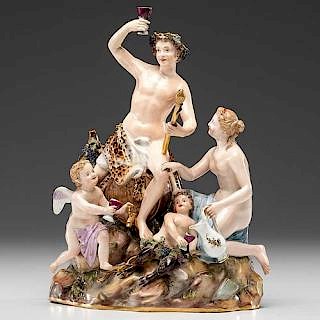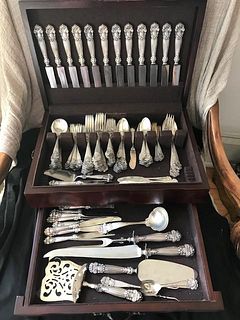International Silver Co. Sterling Presentation Flatware Service Dedicated to Commander Henry Nevius
About Seller
6270 Este Ave.
Cincinnati , OH 45232
United States
With offices in Cincinnati, Cleveland and Denver, Cowan’s holds over 40 auctions each year, with annual sales exceeding $16M. We reach buyers around the globe, and take pride in our reputation for integrity, customer service and great results. A full-service house, Cowan’s Auctions specializes in Am...Read more
Two ways to bid:
- Leave a max absentee bid and the platform will bid on your behalf up to your maximum bid during the live auction.
- Bid live during the auction and your bids will be submitted real-time to the auctioneer.
Bid Increments
| Price | Bid Increment |
|---|---|
| $0 | $25 |
| $500 | $50 |
| $1,000 | $100 |
| $2,000 | $250 |
| $5,000 | $500 |
| $10,000 | $1,000 |
| $20,000 | $2,500 |
| $50,000 | $5,000 |
| $100,000 | $10,000 |
About Auction
Oct 17, 2015 - Oct 18, 2015
Cowan's Auctions dawnie@cowans.com
- Lot Description
International Silver Co. Sterling Presentation Flatware Service Dedicated to Commander Henry Nevius
Connecticut, ca 1908. A sterling presentation flatware service for twelve by International Silver Co. in the Florence pattern, a total of 193 pieces including twelve of each: place forks, luncheon forks, salad forks, cocktail forks, tablespoons, soup spoons, butter knives, ice cream spoons, place knives, luncheon knives, salt spoons and demitasse spoons, twenty four tea spoons, six serving spoons, a gravy ladle, a sauce ladle, a fish server, a tomato server, a meat fork, an asparagus server and a cake server, all monogrammed N and marked for International Silver Co. and Smith & Patterson Co., also including twelve salts by Watson Co. Cocktail forks, salad forks, demitasse spoons, ice cream spoons, salts, salt spoons and serving pieces are partial-gilt; cake server lg. 11.25 in., case ht. 11, wd. 25, dp. 17.75 in., certificate 15.5 x 23 in., silver wt. (excluding knives) 181.592ozt (5647g).
Service is housed in a mahogany silver chest having a lift top and two drawers, all lined in satin and fitted to hold flatware. Chest features brass plaque monogrammed N and interior gold plaque reading Presented to / Comrade Henry Nevius / Commander-in-Chief / Grand Army of the Republic / 1908-09 / By the 43rd National Encampment Held / At Salt Lake City, August 5th 1908. / In recognition of the valor and sacrifice / in war; devotion to his comrades. / Intelligent, earnest, and effective / effort in behalf of our order.
Lot also includes a certificated dated October 26th, 1894, appointing Henry Nevius as Chief of Staff in the Grand Army of the Republic.
Henry Martin Nevius (1841-1911) enlisted in 1861 and initially served as a Commissary Sergeant in the Army of the Potomac. A year later, he was promoted to Second Lieutenant in the 7th Michigan Cavalry, serving under General Custer. Returning to serve in the 25th New York Cavalry, Nevius was promoted to Major in 1864 by President Lincoln after sustaining wounds while leading a defense against General Early's attack on Washington. Nevius was also present at Antietam and Gettysburg and was wounded in action a minimum of four times.
Following the war, Nevius had a successful career as a lawyer and politician in his home state of New Jersey. He became involved with the Grand Army of the Republic in 1881 and served in several positions over the next few decades, culminating in his appointment as Commander-in-Chief in 1908. - Shipping Info
-
SHIPPING. At the request of the buyer, Cowan's will authorize the shipment of purchased items. Shipments usually occur within two weeks after payment has been received. Shipment is generally made via UPS Ground service. Unless buyer gives special instructions, the shipping method shall be at the sole discretion of Cowan's Auctions, Inc.. Cowan's is in no way responsible for the acts or omissions of independent handlers, packers or shippers of purchased items or for any loss, damage or delay from the packing or shipping of any property.
-
- Buyer's Premium



 EUR
EUR CAD
CAD AUD
AUD GBP
GBP MXN
MXN HKD
HKD CNY
CNY MYR
MYR SEK
SEK SGD
SGD CHF
CHF THB
THB

















